 zachary harden
zachary harden
Keywords: ufe | unidentified flags | 2019 |
Links: FOTW homepage | search | disclaimer and copyright | write us | mirrors

Last modified: 2025-10-11 by  zachary harden
zachary harden
Keywords: ufe | unidentified flags | 2019 |
Links: FOTW homepage |
search |
disclaimer and copyright |
write us |
mirrors
Please note our Policy for Submissions and Enquiries.
Below is a series of images of flags that have been provided to FOTW; some we have recognized, and some we have been unable to recognize. If you can help us identify any of these flags, please let us know! Contact the: UFE Editor.
Identification Key:
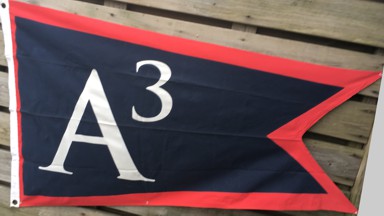 Image from Robert Egbert, 2 January 2018
Image from Robert Egbert, 2 January 2018
What can you tell me about this one? It measures 3' x 5' is nicely stitched, brass grommets, stiff sailcloth and no markings whatsoever. Have you seen this design before? Seems to be made of a very tightly woven sailcloth, all screened, two brass grommets. That's it, any ideas?
Robert Egbert, 2 January 2018
This is not a flag I have seen - the closest I can come is the American West African Line, but I suspect the A^3 refers to A-cubed, meaning an A-A-A club, likely a local sailing club. Any insights?
Rob Raeside, 2 January 2019
Solved! I called an old international sailor friend of mine and he knew this flag and the boat it came from. It is A3, the Americas Cup defender and winner in the 1992 series. She was referred to as America Cubed and was owned by one of the Koch brothers, you know who they are. She also tried to sail in the 95 cup being crewed by all women but lost in the finals to Dennis Connor.
Robert Egbert, 3 January 2019
Is its usual for civil individual vessels to have their own flags in
this kind of design, instead of the less imaginative onomasts? Or is
this rather the flag of the company or team or project who managed it?
As for the apparently incorrect identification as American West African
Line, which is unrelated to _America³_, the design
is strikingly similar: Could it be just a coincidence?
It’s darkest blue tappering flag with forked fly and a red border all
around with large white inscription "A³" (I used Goudy Trajan, slightly
modified, but it’s still not exactly right: better typography match
sought!). The central concave corner differs sharply as printed, on the
red/blue boundary, and as cut/sewn, on the outer edge of the flag. Is
that a design choice or textile mishap?.
António Martins-Tuválkin, 2 June 2024
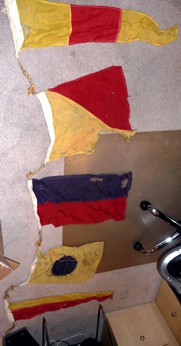 Image from Brad Emalfarb, 5 January 2019
Image from Brad Emalfarb, 5 January 2019
I recently pulled these out of a British archive I picked up the majority was 1880's era. I would love any help you may be able to give me regarding age and or signals etc...
Brad Emalfarb, 5 January 2019
These flags are the symbols for 0 - O - E - I - 7 using the International Code of Signals, but I don't know their significance as
a string of flags.
Rob Raeside, 5 January 2019
These flags now have these meanings, but several have gotten those meanings in the 20th century, during the Interbellum; 1932, I think.
If the majority of the archive is very large - like everything but the flags - then the flags are unlikely to have had those relatively modern meanings. On the Other Hand, the flags that weren't in use earlier may well allow setting a time range for ICS flags.
Also, if this is indeed an original string of flags, it might be possible to determine the meaning. Considering the state of the flags and the fact they weren't spilt up after use. it would be tempting to think that this was an often-used signal, which suggests a ship's registration number. Do we know how to look that up?
Peter Hans van den Muijzenberg, 6 January 2019
It sounds as if the ship in question might have been "making her number" with the flags kept as a souvenir?
Christopher Southworth, 6 January 2019
Some while back I helped to at least partially identify some maritime signal flags from a Victorian era painting (UFE14-12). I expect that the same research resources cited back then may also assist Mr. Emalfarb in identifying this string of signal flags.
Bill Connelly, 22 January 2019
 Image from Albert S. Kirsch, 15 January 2019
Image from Albert S. Kirsch, 15 January 2019
What is the flag at the extreme left?
Albert S. Kirsch, 15 January 2019
That is the flag of the "Stand of Defiance European Movement" [SODEM].
Anti-Brexit, as I understand it, but I'll have to leave the details to the natives.
Peter Hans van den Muijzenberg, 15 January 2019
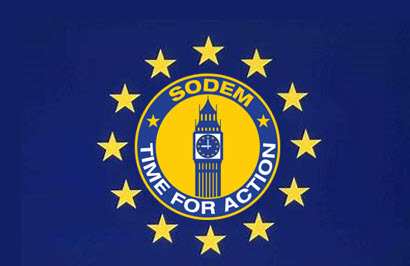 #3a
#3a
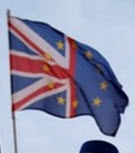 #3b
#3b
Image from Pete Loeser, 18 January 2019
I add this partially done drawing of the flag in question (#3a). It is missing a line of gold text across the top portion that I believe "might" be the SODEM web address and their telephone number? I leave it to one of our illustrators to finish my drawing.
Also not mentioned by Al was a second anti-Brexit protest flag (#3b) that is also being used by the demonstrators. It is an interesting combination of the Union Jack and European Union flag. [Actually one of many designs being used or suggested.]
Pete Loeser, 18 January 2019
However, what it says along the top of the Stand of Defiance European Movement flag, is really: "Stand of Defiance European Movement".
Peter Hans van den Muijzenberg, 19 January 2019
There are also a couple of other interesting flags in Al's original picture. One flag in the (center back row) behind the EU flag appears to have all the individual European Union member's national flags on it, and to its right is another EU flag (reverse side) with a slanted (white?) rectangular object between the gold circle of stars and the hoist. A quick search didn't find any clear images of either of these flags.
Pete Loeser, 19 January 2019
I assume the first an all-divisions flag for the EU. I don't see the attraction of all-divisions flags, but they seem popular, especially with the camp site crowd. (example #1) (example #2) (example #3)
In the case of the EU, very occasionally you may even see a correct one. (Germany) I've seen others.
On the second could you elaborate a bit; I have no idea what flag you're referring to here.
Peter Hans van den Muijzenberg, 20 January 2019
 Image #3c from Pete Loeser, 20 January 2019
Image #3c from Pete Loeser, 20 January 2019
You bet, I attach a cropped detail (#3c) of the flag in question.
Pete Loeser, 20 January 2019
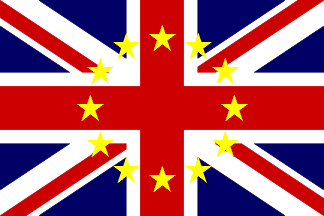 Image from Tomislav Todorovic, 20 January 2019
Image from Tomislav Todorovic, 20 January 2019
An example of a British "Stop Brexit" flag is presented at FOTW here. Attached herewith is a redo of current FOTW image
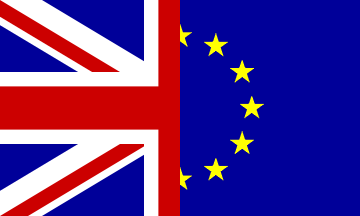
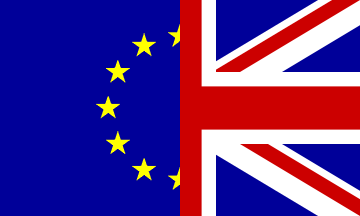
Images from Tomislav Todorovic, 20 January 2019
Two other flags are created by "marshalling by dimidiation" of the UK and EU flags. Version with the hoist half of the UK flag and fly half of the EU flag can be viewed here. Note how the dimidiation was not precisely done (star cut by the partition line) - the flag is obviously homemade.
Another version with the hoist half of the EU flag and fly half of the UK flag can be viewed here. Also note that the shade of blue is the same in both fields, closer to that of the EU flag than that of the UK flag.
Tomislav Todorovic, 20 January 2019
A small observation here, on image #3b the circle of stars appear to continue superimposed on the Union Jack host side of the flag, thus differing from these excellent drawings.
Pete Loeser, 20 January 2019
Quite right - that image was contributed separately.
Tomislav Todorovic, 20 January 2019
I believe this (#3c) is very likely to be a simply an EU flag with one of the popular yellow "BOLLOCKS TO BREXIT" stickers stuck on to it. Impossible to see detail, though.
Colin Dobson, 21 January 2019
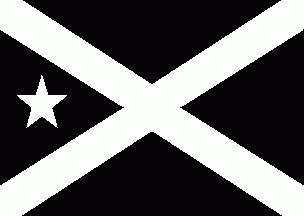 Image from Klaus-Michael Schneider, 25 January 2019
Image from Klaus-Michael Schneider, 25 January 2019
Unknown black Flag, divided by a white saltire, in hoist quarter a white 5-point star. It is flown during Catalan rallies for independence from Spain. I saw this flag several times in German news (Tagesschau). It might be a Catalan Anarchist flag due to its black colour.
Klaus-Michael Schneider, 25 January 2019
The flag, of modern creation (2014), is called the Tricentennial flag. Here the black color is not related to anarchism but to historical Catalan flags.
In July 2014, the Museum of History of Catalonia, Barcelona, presented the Tricentennial flag, a black flag charged at hoist with a white star and in the center with a white saltire.
The flag was pushed by the Reeixida Foundation, founded in 2004, as part of a "rehabilitation of the banners of the War of Spanish Succession". Exhibiting a straightforward independentist message, the flag was hoisted on 11 September 2014, the National Day of Catalonia (Diada) by 34 Catalan municipalities, and on the same day in subsequent years.
The flag commemorates the hoisting on 9 July 1713 of a black flag by the defenders of the castle of Montjuïc to indicate to Philip V's troops that they would resist until death. More generally, the black color recalls the flags used during different insurrections in Catalonia. The star recalls the estelada independentist flag, while the saltire is the Cross of St. Eulalia, Barcelona's co-patron saint. The cross is formed of two letters "V", meaning "Votar" [(Vote) for independence] and "Victoria" (Victory). (source)
Ivan Sache, 27 January 2019
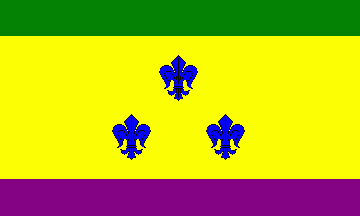 Image from Klaus-Michael Schneider, 25 January 2019
Image from Klaus-Michael Schneider, 25 January 2019
Modified by Peter Hans van den Muijzenberg, 25 January 2019?
Unknown yellow Flag with green stripe at top edge and purple stripe at bottom edge, in the middle of the yellow field there are three blue fleur-de-lis ordered 1:2. This flag is hoisted on the balcony of the pub of "Pride" King, protagonist of American TV-series Navy CIS New Orleans. It is not the city flag (I checked that). The most similar flag in our pages has to do something with New Orleans carnival (Mardi Gras).
Klaus-Michael Schneider, 25 January 2019
Not just any Mardi Gras flag; it's specifically one from New Orleans, as it has green in it.
Peter Hans van den Muijzenberg, 27 January 2019
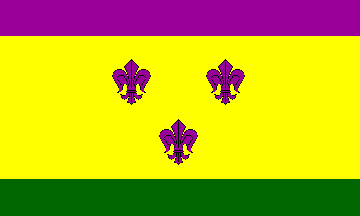 #5a
#5a
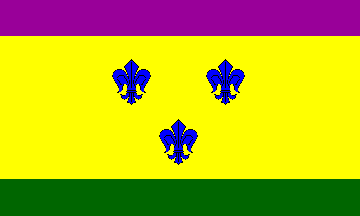 #5b
#5b
Speculative images from Tomislav Todorovic, 29 January 2019
If there indeed were two fleurs-de-lys next to purple stripe, then the flag probably looked like this modification of Peter Hans van den Muijzenberg' image (#5a) and if the fleurs-de-lys were indeed blue, which would make reversed colors of French COA, then the flag should have looked like this modification of Peter Hans van den Muijzenberg' image (#5b), with Michael's colors.
While I didn't watch the series in which the flag was shown, remember that the New Orleans flag also displays four colors. Michael, are you sure that the colors of stripe and fleurs-de-lys differed?
I also have no idea if the design is used in real life, or was invented for the screening, but even if the latter was the case, it might inspire some inventive flag manufacturer to offer it for sale, as has already been happening, especially after a flag was presented at the FOTW-ws and/or Wikipedia and/or Wikimedia Commons. Just wait and see...
Tomislav Todorovic, 29 January 2019
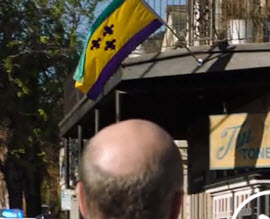 Image from Pete Loeser, 2 February 2019
Image from Pete Loeser, 2 February 2019
The flag in question definitely has green stripe on top. The three fleurs-de-lis appear to be a darker purple or blue. See attached screen shot detail.
Pete Loeser, 2 February 2019
Thanks, I was painting from memory, as it was only for moments on the screen. I am fairly sure, the fleur-de-lis are blue (as I was thinking "How odd the colours!"), but I am not sure, whether they are well ordered (2:1) or the other way round (1:2).
Klaus-Michael Schneider, 25 January 2019
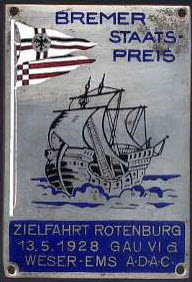 #6a
#6a
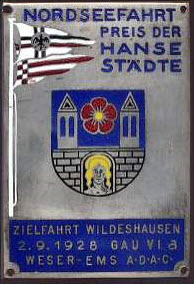 #6b
#6b
Images from Klaus-Michael Schneider, 25 January 2019
It is twice the same flag, a white triangular pennant, divided by an off centred cross of black-white-red, the Imperial German colours. In the centre of the cross is a grey disc fimbriated black charged with a black eagle. (The other pennant obviously belongs to Bremen) I guess, it is the old pennant of the dissolved ADAC Yacht Club, but I am not sure. Perhaps someone knows better?
Klaus-Michael Schneider, 25 January 2019
Even if this doesn't turn out to be an ADAC pennant it seems like a good time to share one of our old essays on HFoOA on the subject. It is very similar to your illustration of the General German Automobile Club pennant of 1918-1932. It also resembles the ADAC flag reported in 1953.
Pete Loeser, 27 February 2019
The ADAC Yacht Club burgees, as we know them to have been, had German colours for the cross's fimbriation, rather than bars of the national flag, and had an anchor in the top hoist.
I can't help but think we've seen such a cross before, but I can't recall the details. Black, white, red, would that be national colours at that time, or does it indicate a right leaning (or history from Imperial times)? Does anyone know whether a Gau was a common subdivision at the time (1928), or does this suggest National Socialism?
Peter Hans van den Muijzenberg, 27 January 2019
As far as I know, the subdivisions of ADAC are still Gaue and have ever been, and as the images are from 1928, it has nothing to do with NS and the colours are still referring to the pre 1918 imperial colours.
Klaus-Michael Schneider, 27 January 2019
Let's not fall into the trap again of assuming and then based on that assumption "prove" the assumption to be correct.
The NS party had not quite existed for a decade in 1928, but the objects in the photographs mentioning 1928 does not prove they have nothing to do with that party. More interesting would be whether there was only one national car club in Germany at that time, or whether separate political movements included their own car club.
So, was the Germany of that time more likely to have a lazy national club that didn't bother to change its colours to the new national ones, or rather a very conservative one that intentionally used the Imperial colours?
Peter Hans van den Muijzenberg, 27 January 2019
Googling around I found two interesting links:
1) Badge rentals - Item #12660 Dated 1920-1935 - White conical pennant of the German Automobile Club ADAC, horizontal and vertical embroidered black / white / red band, embroidered at the intersection oval imperial ADAC badge, RS yellow with coat of arms of the ADAC Ortsgruppe MCBH 1920, 33x16cm
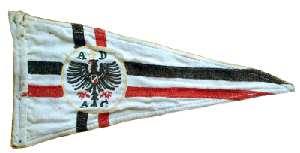 Image from Klaus-Michael Schneider, 2 February 2019
Image from Klaus-Michael Schneider, 2 February 2019
It seems that it is the flag depicted on both plates, and it is not a yacht club pennant but the club pennant instead, showing the old badge of the ADAC, the eagle is black armed red (sometimes golden in other items, uppon his breast there is an inescutcheon parted per bend sinister of black, white and red and having a golden (yellow) fimbriation. This pennant is dated by the seller as 1920. The little symbol probably is a golden number, not being part of the original badge.
2) I also found an ADAC pennant, dated by the seller as 1933, sold together a.o. with a membership card of Adolf Hitler. The design of this pennant already anticipates that one of DDAC on our page: The German Automobile Club (Der Deutsche Automobil Club/DDAC) pennant (1933-1945). I've plan to paint images of both.
Klaus-Michael Schneider, 2 February 2019
That one on the metal plate, I'll omit in my painting. By-the-way, I agree with Peter Loeser that it is no YC pennant. At that time it was absolutely normal to use triangular pennants on bicycles and motorcycles. As ADAC was founded as a motorcycle club, it is very likely that we have here the club pennant.
Klaus-Michael Schneider, 10 February 2019
I simply can't figure out why when submitting any entry (especially Unknown Flags or Ensigns) there is usually no source reported, nor URL for that matter, in order to facilitate the positive identification of the item sent. [I hear ya' - Ed.] That said, I came across this link, which is most likely a collectors' site, offering all kinds of memorabilia (mostly commemorative coins and pins) on the ADAC.
So, #6a is originally found here. (source) The picture caption reads (in German): Bremen 1928, Bremer Staatspreis, Zielfahrt nach Rotenburg Gau VI a Weser-Ems ADAC (Bremen 1928, Bremen State Prize, destination trip to Rotenburg Gau VI and Weser-Ems ADAC).
And entry #6b is also originally found here. (source) The picture caption reads (in German): Bremen 1928, Nordseefahrt, Preis der Hansestädte, Zielfahrt nach Wildeshausen, Gau VI a Weser-Ems ADAC, kleiner Chip in der Bremer Flagge (Bremen 1928, Nordseefahrt, price of the Hanseatic cities, destination trip to Wildeshausen, Gau VI and Weser-Ems ADAC, small chip in the Bremen flag).
Both of the above mentioned pins belong to Gau VI (District 4) of Weser-Ems in Lower Saxony, of which both Rotenburg and Wildeshausen, are part of. (source #1) (source #2) (source #3).
So the conclusion is that yes, it is an ADAC pennant and a variant of this previously mentioned1918-1932 pennant. (source), and not the ADAC Yacht Club pennant as the first hypothesis indicated.
Esteban Rivera, 16 February 2019
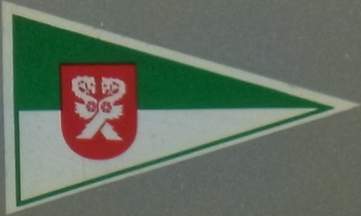 #7a
#7a
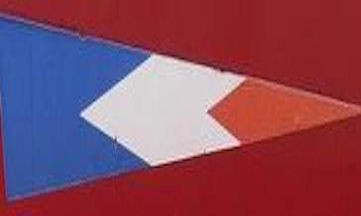 #7b
#7b
Images from Klaus-Michael Schneider, 2 February 2019
Two more car stickers probably from sailing clubs, shot in my quarter years ago:
I would have guessed Niedersachsen Werder, but that has the field mono-coloured. Someone less likely to mix up the German cases could ask them whether they know of this one, though.
Peter Hans van den Muijzenberg, 10 February 2019
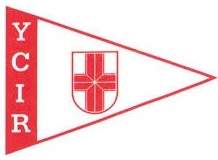 Image from Klaus-Michael Schneider, 2 February 2019
Image from Klaus-Michael Schneider, 2 February 2019
Here is another one, I can't identify. A white pennant with inescutcheon, fimbriated red and charged with a facetted or, if you prefer gyronny, red cross, red stripe alongside the hoist with inscription YCIR (very likely not Hamburgian, as it is no member of HMC e.V.)
Klaus-Michael Schneider, 2 February 2019
It's the burgee of the Yachtclub Insel Reichenau in Baden-Württemberg, Germany.
Peter Edwards, 2 February 2019
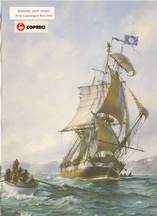
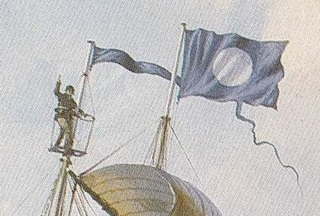
Images from Klaus-Michael Schneider, 2 February 2019
This image is the painting "Whaling Days", painted by Roy Cross, perhaps an artist born 23 April 1924 in London and working for Airfix model kits. A copy of this painting was made for Christmas cards of a company named Copreci. On top there is a blue flag with a white disc. Brocklebank Ltd. (pre 1820 flag) would be a good match. But does anybody know, whether they did any whaling? Acc. to WIKIPEDIA Brocklebank was established 1801 in Whitehaven, (a shipyard had been there before since 1785), and the company moved to Liverpool in 1819. The company acc. to source operated in the Far East and in both Americas. More details I haven't found.
Klaus-Michael Schneider, 2 February 2019
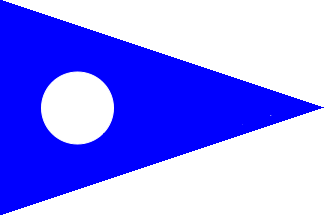 Image from Ivan Sache, 13 February 2019
Image from Ivan Sache, 13 February 2019
Compare Ivan's posting of "Nantucket whalers, 19th century (USA) 13" (posted 11 February 2019) as the pennant of the 1815 whaling schooner "Maria" and described as a "Blue pennant with a white disc at hoist" with this image.
They seem quite similar. Ivan's image is reposted to this message for clarity.
Pete Loeser, 13 February 2019
This might be a mere coincidence, if we remember Ripley's caveat emptor (see "Nantucket whalers, 19th century (USA) 4", posted 3 February 2019): "There are several instances of the same flag used by two or more entities. An example is the flag flown by the ships 'Omega', 'Obed Mitchell', and 'Sarah Parker'. No connection among these vessels has been found. Likewise, the flag flown by ships 'Columbus', 'Franklin II', and 'Planter'; the flag flown by ships 'Massachusetts' and 'Mount Vernon'; and the flag flown by ships 'Charles Carroll' and 'Lexington', each with no discernible connections among the ships, even though, in each case, there was a period when the vessels in each group were sailing contemporaneous."
There was no registration or other means of establishing propriety in the design of a flag. The wording of patent and copyright legislation excluded trademarks, under which private signal flags fall. Federal protection of trademarks was first legislated in 1946 under the Lanham Act. Prior to this, trademarks fell under state common law emanating from the tort of unfair competition."
Ivan Sache, 13 February 2019
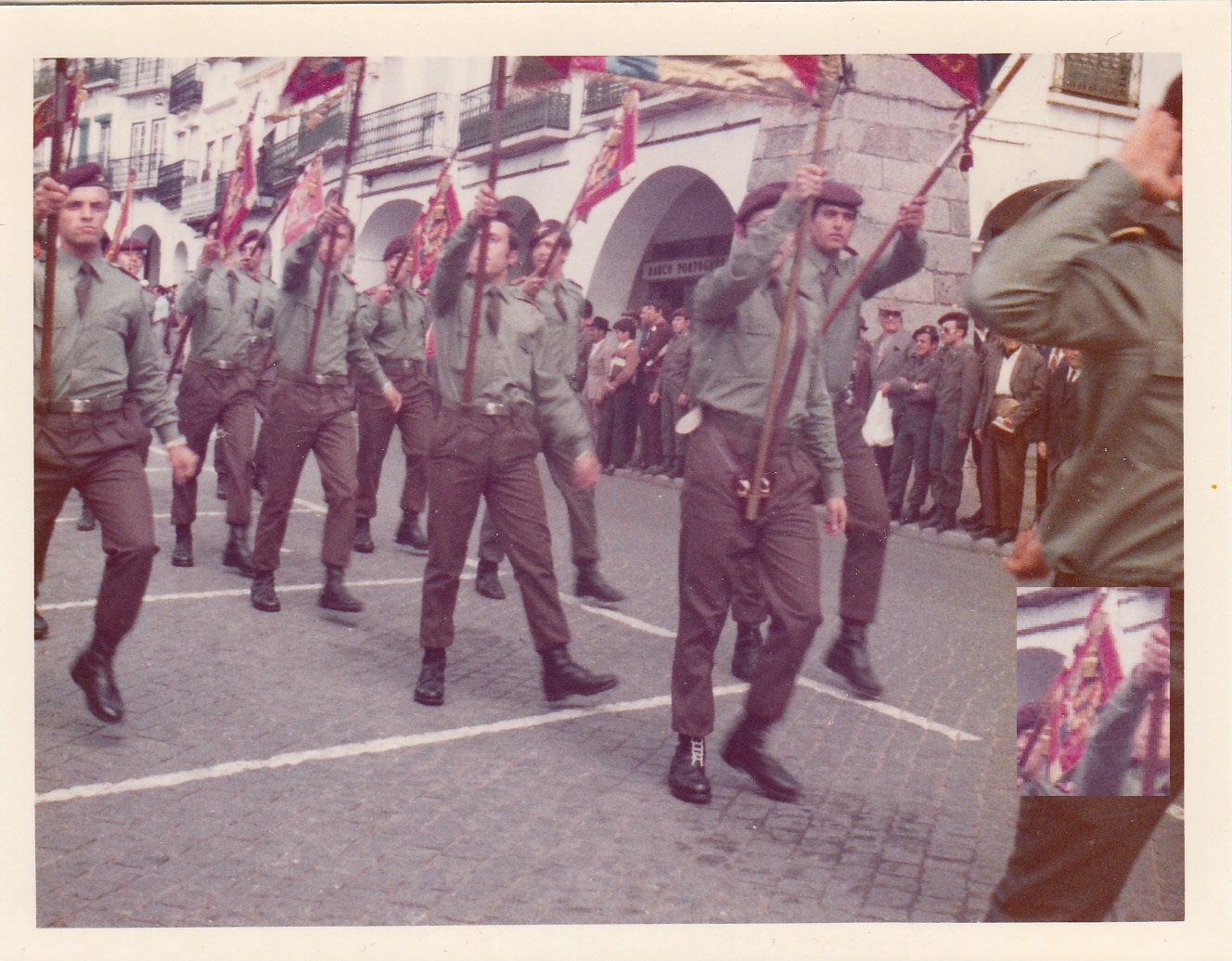 Image from Klaus-Michael Schneider 3 February 2019
Image from Klaus-Michael Schneider 3 February 2019
I don't know much: 1) It's Portuguese. 2) The photo is probably made in the Algarve in the early 1980s. Thus it probably is an army unit, and no militia of the state party (Salazar then didn't rule any more).
Klaus-Michael Schneider 3 February 2019
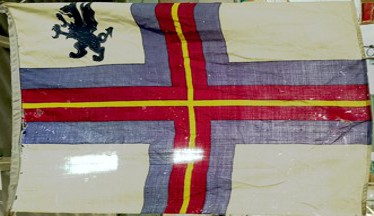 Image from Jason Saber, 17 February 2019
Image from Jason Saber, 17 February 2019
My friend and vexi colleague Dave White spotted this intriguing design in a Dorset warehouse. Could it have been an old attempt at a county flag perhaps? Or maybe a club, society or regimental flag with a county or regional theme?
Jason Saber, 17 February 2019
Although it was found in Dorset, the flag might actually be from Somerset, for it employs the elemets of the Somerset County Council CoA - there is a dragon rampant in the canton, although in black color which is absent from the CoA, and the cross employs all three tinctures present in the CoA.
Tomislav Todorovic, 17 February 2019
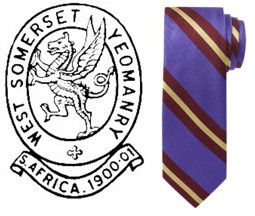 Image from Brady Ells, 17 February 2019
Image from Brady Ells, 17 February 2019
I believe this flag is most probably a flag of the West Somerset Yeomanry. The Yeomanry's badge was the Somerset Dragon and it's colours are recorded officially recorded as being "Violet, Campari red" and a narrow strip of "corn", as attached. Dave White, who first came across the flag tells me that he believes the blue/purple fimbriation could indeed be described as "violet". I think the combination of the rampant dragon, the unusual usage of violet and the narrow strip of yellow make it too much of a coincidence to be attributed to anything else.
Brady Ells, 17 February 2019
[See the same picture at:] British County Flags. ["...It also appears that the West Somerset Yeomanry may have been the first group to have featured the acknowledged county emblem on a flag,... The regimental colours, officially (and somewhat exotically!) 'violet, Campari red and corn'..."]
Peter Hans van den Muijzenberg, 17 February 2019
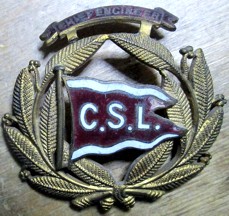 Image from Gerald Newman, 25 February 2019
Image from Gerald Newman, 25 February 2019
Perhaps you or someone else can identify the flag on this hat badge.
Gerald Newman, 25 February 2019
Usually CSL stands for Canada Steamship Lines, but I don't see anything with this pattern on our page for that line. It could be a position flag for the engineer.
Rob Raeside, 25 February 2019
I'm also unsure how to make a "club" name out of this, unless it's from a romance language, and therefore starts with it.
Well, the pin already says "Chief Engineer". Would it do so for a flag for an engineer?
Is there context beyond "hat badge"? E.g.: Where did the pin come from? If it was bought, where did the seller get it from? Is there anything on the reverse that helps us determine the origin? Any detail may make the search easier.
Peter Hans van den Muijzenberg, 25 February 2019
Gerald did provide an image of the back - it is completely blank. I should have mentioned that in my comment.
Rob Raeside, 25 February 2019
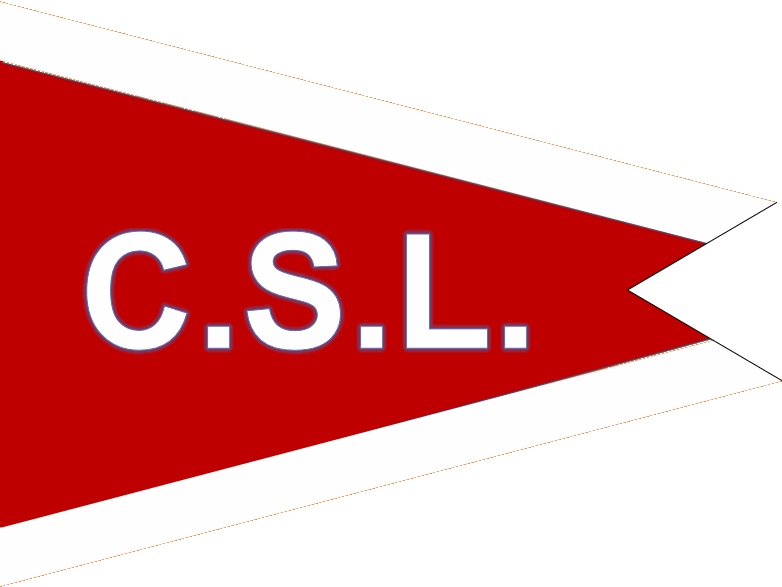 Image from Pete Loeser, 16 March 2019
Image from Pete Loeser, 16 March 2019
I made a quick slightly off-center drawing of the flag on the badge to do an image search, but no luck. I attach it in case somebody needs a starting point.
Pete Loeser, 16 March 2019
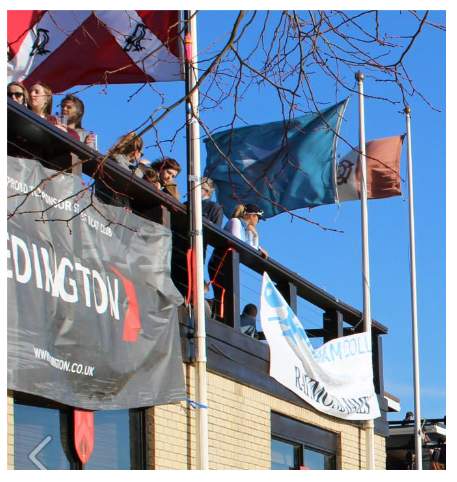 Image from Klaus-Michael Schneider, 9 March 2019
Image from Klaus-Michael Schneider, 9 March 2019
I guess, the flag in question, left seen from reverse, belongs to St. Anne's College in Oxford, because it is hoisted on top of St. Anne's boat house, but there is a mismatch, as the wreath and the sword in base are missing. Does anybody know for sure if this is actually a St. Anne's flag or something else? Should we make it a variant of St. Anne's?
Klaus-Michael Schneider, 9 March 2019
In the
picture, there are three flags, from left to right, as follows:
1. St. Anne's College Boat Club flag
2. UFE (identified as Wadham College Boat Club flag)
3. Pembroke College Boat Club flag
Plus two additional hanging banners over St Anne's College Boat Club
1. Redington
2. White background banner that reads on top "WADHAM COLLEGE" and on
the bottom "RAYMOND JAMES" (full name Raymond James Financial; sponsor)
Esteban Rivera, 18 April 2023
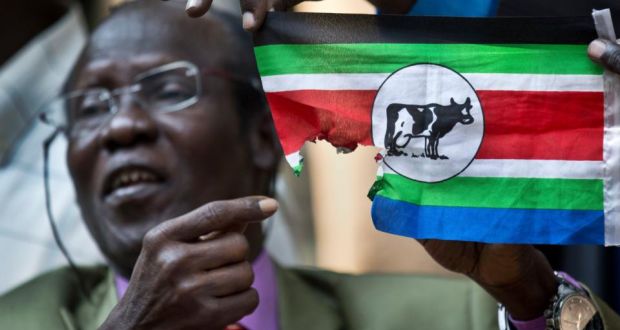 Image from Jens Pattke, 9 March 2019
Image from Jens Pattke, 9 March 2019
Can anyone identify the flag?
Jens Pattke, 9 March 2019
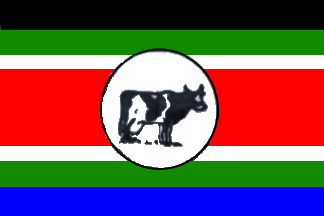 Image from Ivan Sache, 9 March 2019
Image from Ivan Sache, 9 March 2019
The caption of the photo says: "South Sudanese vice-president James Wani Igga holds up a flag the government claims is of the rebel forces loyal to former vice-president Riek Machar, at a press conference in Juba".
According to the article (The Irish Times, 30 December 2013), this flag would belong to the Nuer White Army ethnic militia. The cow featured on the flag might be related with the group's name: "The White Army are recognized by the ash, prepared from burnt cow dung, with which they cover themselves to ward off insects."
Ivan Sache, 9 March 2019
Wikipedia calls Machar's group the Sudan People's Liberation Movement-in-Opposition. The allied White Army formed over protecting their cattle from raids, while a prior group had a different flag.
Steve Shumaker, 9 March 2019
This actually is the flag of United Democratic Salvation Front(USDF).
Jaume Ollé, 16 March 2019.
The identification first reported by the "The Irish Times" is obviously incorrect. Jaume has subsequently provided the correct identification: the United Democratic Salvation Front. My image is not needed either, since the flag is already presented on the FOTW website page on the United Democratic Salvation Front.
On that page, background could be added, for instance: "The UDSF was founded in 1997 after the signing of the Khartoum Peace Agreement between the central government and the South Sudan Independence Movement/Army (SSIM/A) led by Dr. Riak Machar Teny, who became the first chairman of the party and assistant to the President of the Republic. The UDSF was in fact the first legally established political party by former Southern Sudanese rebels since the beginning of the second civil war in 1983. It declared as its main objectives the pursuing of the right to self-determination for the people of the South and the democratization of the country's system of governance. However, in 2002 Machar left the government arguing that it had failed to implement the peace deal. He was succeeded as UDSF's chairman by Dr. Joseph Malual Dong, an engineer and then federal minister of aviation. When the Comprehensive Peace Agreement of 2005 ended the war in the South, UDSF joined the Government of National Unity (GONU) and the Government of South Sudan (GOSS) with Dr. Malual taking over the federal Ministry of Tourism and Wildlife." (Gurtong Trust - Peace and Media Project.
Ivan Sache, 16 March 2019
However, your drawing of the cow looks more like the cow on the pictured flag. We may have a whole herd of UDSF Bovinae variant flags in our future.
Pete Loeser, 16 March 2019
It does, because it was directly cropped from the photo. Being fascinated, if not mesmerized by cows, and also a fanatic cheese-lover, too, I would be very honored to have contributed to the Bovine Hall of Fame of the FOTW website. Moo!
Ivan Sache, 16 March 2019
Holly Cow, a chance to be a member of the Bovine Hall of Fame doesn't come every day. I'd never herd of a honor like that being offered before now. However if it is a secret I'll not utter a word more!
Actually, to get serious for a second, a close look at the original picture indicates the whole thing was put together by a Photoshop artist. Start counting fingers around the flag. The Vice President and the flag were never actually together in that picture I think.
Pete Loeser, 16 March 2019
 Image from Ivan Sache, 16 March 2019
Image from Ivan Sache, 16 March 2019
You are definitively right. As we say in French, la vache! ("The cow" - more or less the same meaning as "Holy cow!"). I have found another photo showing the flag, which appears to be more authentic, but unfortunately the source website does not reply.
Ivan Sache, 16 March 2019.
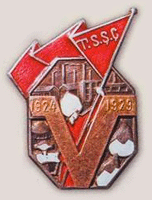 #15
#15
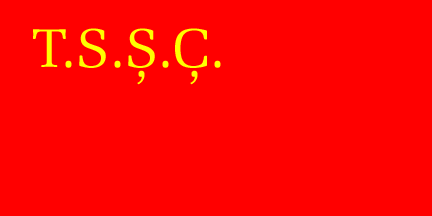 #15a
#15a
Images from Victor Lomantsov, 11 March 2019
I have found an interesting commemorative - "5 years of Turkmen SSR. 1924-1929" with an image of an unknown state flag (#15) - with the letters T.S.Ş.Ç. - See my reconstructed image of the flag (#15a). I know this variant is not shown in vex literature (we only know about flags with TSSR abbreviation) does anybody know something about it?
Victor Lomantsov, 11 March 2019
The use of this flag in 1929 is highly likely. The abbreviation in Latin letters T.S.S.Ç. stands for the name TУRKMENISTAN SOTSIALIST ŞURALAR ÇEMHURIJETI in Turkmen laguage. The version T.C.C.P. in Cyrillic letters is the variant in Russian languge.
Jens Pattke, 23 March 2019
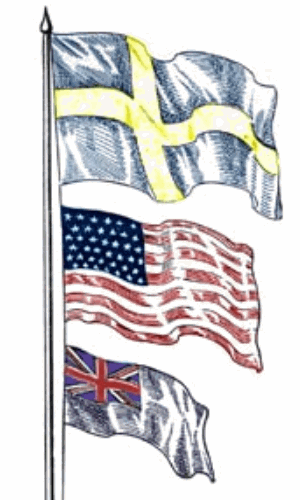 Image from Peter Hans van den Muijzenberg, 16 March 2019
Image from Peter Hans van den Muijzenberg, 16 March 2019
We've visited this page before, in the story of the "blue White Ensign of England", but nobody mentioned at the time the other (top) flag on the page. Does anyone have an idea?
Peter Hans van den Muijzenberg, 16 March 2019
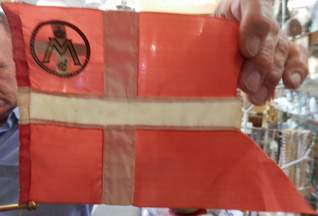
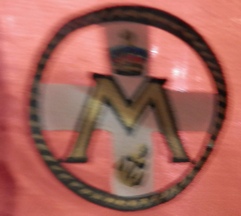
Images from Klaus-Michael Schneider, 19 March 2019
I spotted this one inside an antiques shop in Hillerød in North Sealand (Denmark) on 9 June 2016. The trader had no idea about the flag. It is a Danish split flag with a badge in the canton as follows: in a golden segmented annulet is a throughout white Greek cross, supperimposed bz a golden czpher "M", topped bz a crown, and beneath a fowl anchor in bend sinister, all charges are golden fimbriated black.
Klaus-Michael Schneider, 19 March 2019
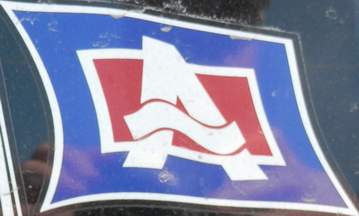 Image from Klaus-Michael Schneider, 19 March 2019
Image from Klaus-Michael Schneider, 19 March 2019
I spotted this one on 3 June 2016 on a car park near Tinkerup Beach in Gilleleje in North Sealand (Denmark). As the car plate was German (none of the usual suspects in the North), I assume the origin is German. The flag is red with a blue bordure fimbriated white, over all a white initial "A" having a wavy bar instead of a horizontal one. No idea, might be a shipping line, a shipbuilder or any other company.
Klaus-Michael Schneider, 19 March 2019
The flag is identified as German company André Wieczorek.
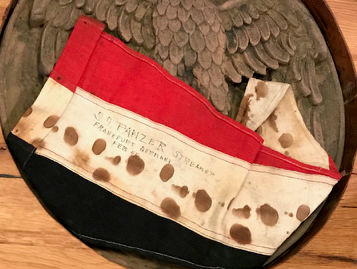 Image from Tom Frank, 19 March 2019
Image from Tom Frank, 19 March 2019
Many years ago (1976) I was given this bloodstained pennant by a veteran. He has written "SS Panzer Streamer" on it and he took it from a tank in Frankfurt in 1945. I suspect it is a divisional or command pennant of some kind, but I don't know. It is probably ordinary panzer rather than SS as there is nothing about it to suggest it is an SS item. Can you tell me anything more specific about it?
Tom Frank, 19 March 2019
I think, I might be able to help. The pennant is upside down, and is probably a Command flag for the commander of a division. (source)
On first sight it does not look like anything SS related, however, the colours of the black-white-red pennant of the Division-Commander of the SS-volunteer legion - Netherlands (Niederlande) looks pretty similar. (source)
With the use of the word "Streamer" I am lost, it is not a German word. Maybe the 11th Panzerdivison (Wehrmacht, not SS) was in the Frankfurt area in 1945?
Nahne Bienk, 28 March 2019
A streamer is a long narrow ribbon attached to a flag's staff, such as those upon which battle honors are inscribed. (See the Dictionary of Vexillology - streamer for more detail). Streamers are also used as commissioning pennants when naval warships are first launched. I think you are correct about the colors, and it being folded upside-down, but being folded it does not give one much to go on.
Pete Loeser, 28 March 2019
After looking at the image, if there hadn't been the inscription, I would have also thought the pennant is displayed upside down. Furthermore I am not sure about the word "streamer". Germans would use the term "Wimpel" instead. There also seems to be a number in front of the word "Panzer". And it can't be recognise which Frankfurt it is. I guess, Wehrmacht units would have used pennants in their unit colours, which would be in case of tank divisions - a triband pink-black-pink, as it is now in Bundeswehr. But I am no expert in German Military flags (except Hamburg). I am afraid that doesn't help much.
Klaus-Michael Schneider, 30 March 2019